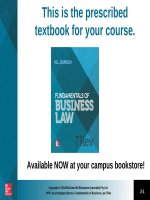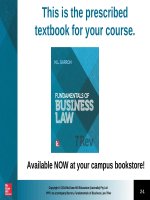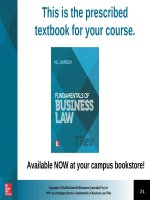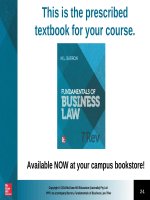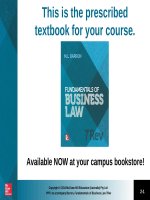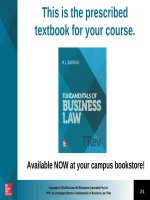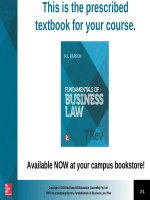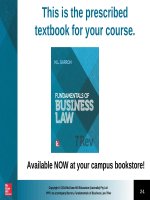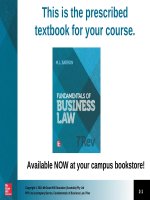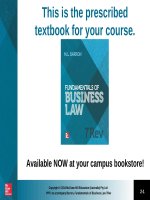- Trang chủ >>
- Thạc sĩ - Cao học >>
- Luật
Lecture Fundamentals of business law (7/e): Chapter 13 - M.L Barron
Bạn đang xem bản rút gọn của tài liệu. Xem và tải ngay bản đầy đủ của tài liệu tại đây (584.44 KB, 43 trang )
This is the prescribed
textbook for your course.
Available NOW at your campus bookstore!
Copyright © 2014 McGraw-Hill Education (Australia) Pty Ltd
PPTs to accompany Barron, Fundamentals of Business Law 7Rev
•2-1
CONSUMER
PROTECTION
LEGISLATION
CHAPTER 13
Copyright © 2014 McGraw-Hill Education (Australia) Pty Ltd
PPTs to accompany Barron, Fundamentals of Business Law 7Rev
•
13-2
•2-2
Learning objectives
At the end of this chapter you should
understand:
• the main principles of consumer protection legislation
• how the Australian Consumer Law (ACL) was enacted
• the significant role the ACL plays in providing protection
to consumers
• the provisions of the ACL that deal with:
– unfair trade practices
– misleading or deceptive conduct
– unconscionable conduct
– product safety and product information
– consumer guarantees
– manufacturers’ and importers’ liability
Copyright © 2014 McGraw-Hill Education (Australia) Pty Ltd
PPTs to accompany Barron, Fundamentals of Business Law 7Rev
•2-3
Learning objectives (cont.)
• the civil remedies, criminal penalties and defences
available to aggrieved consumers
• the criminal penalties imposed for a breach of the
Australian Consumer Law the defences that can be
claimed
• the functions of the Australian Competition and Consumer
Commission
• the functions of small claims tribunals and agencies.
Copyright © 2014 McGraw-Hill Education (Australia) Pty Ltd
PPTs to accompany Barron, Fundamentals of Business Law 7Rev
•2-4
Introduction
• Legislation to protect consumers in Australia
has recently been significantly reformed.
• This reform has taken place with the
cooperation of the federal government
together with all state and territory
governments.
• This has resulted for the first time in a national
approach and application to the regulation of
traders (no matter what their structure) and the
protection of consumers across Australia.
Copyright © 2014 McGraw-Hill Education (Australia) Pty Ltd
PPTs to accompany Barron, Fundamentals of Business Law 7Rev
•2-5
Consequences of national reform
• 1 January 2011, the Trade Practices Act 1974
(Cwlth) became the Competition and Consumer
Act 2010 (Cwlth), (CCA).
• 1 January 2011, the Australian Consumer Law,
(ACL), Schedule 2 of the CCA, became fully
operative.
• The ACL has overcome the constitutional difficulties
confronted by the TPA, replaced all state and
territory fair trading legislation and applies to all
consumer transactions across Australia.
• The ACL is jointly administered and enforced by the
ACCC and state and territory authorities.
Copyright © 2014 McGraw-Hill Education (Australia) Pty Ltd
PPTs to accompany Barron, Fundamentals of Business Law 7Rev
•2-6
Who is a consumer under the ACL?
ACL section 3 provides that:
•
A person is regarded as a consumer of goods and services:
– If the goods or services are priced at $40 000 or less.
– If goods or services of any price are of a kind ordinarily
acquired for personal, domestic or household use or
consumption.
– For commercial road vehicles
– And that goods must not be acquired for resupply or
manufacturing.
Copyright © 2014 McGraw-Hill Education (Australia) Pty Ltd
PPTs to accompany Barron, Fundamentals of Business Law 7Rev
•2-7
ACL Chapter 3 Part 2.1 Unfair
practices—Section 18
• Section 18: Prohibition on misleading and
deceptive conduct
A person must not, in trade or commerce, engage
in conduct that is misleading or deceptive or likely
to mislead or deceive.
• Concept of conduct very broad, may include
advertising, contractual negotiations, even silence
• Commonly used not only by consumers but by
business against business
Copyright © 2014 McGraw-Hill Education (Australia) Pty Ltd
PPTs to accompany Barron, Fundamentals of Business Law 7Rev
•2-8
Section 18—misleading and
deceptive conduct
• Remedies:
– Civil action for damages
– Injunction to stop misleading or deceptive conduct
– Community services orders
– Corrective advertising orders
– Adverse publicity orders
– Substantiation orders
– Undertakings
Copyright © 2014 McGraw-Hill Education (Australia) Pty Ltd
PPTs to accompany Barron, Fundamentals of Business Law 7Rev
•2-9
Chapter 2 Part 2.2 Unfair practices—
unconscionable conduct
Part 2.2 prohibits unconscionable conduct where a stronger
party takes advantage of another party’s weakness or
ignorance.
•Section 20: general duty on persons in trade and commerce to
trade fairly—specifically embraces common law principles of
unconscionability already established by the courts.
•Section 21: deals with unconscionable conduct by a person in
trade and commerce in connection with the supply of goods and
services to consumers.
•Remedies: orders directed towards the contract itself
contract void
contract varied
refusing to enforce contract
directing refund of money/return of property
ordering repair or provision of parts for goods
Copyright © 2014 McGraw-Hill Education (Australia) Pty Ltd
PPTs to accompany Barron, Fundamentals of Business Law 7Rev
•2-10
Meaning of unconscionable
conduct
• Where one party to a transaction is at a
disadvantage because of:
– age
– sickness
– sex
– illiteracy
– poverty
– lack of explanation when required
– language (i.e. non-English speaking)
and the other party takes advantage of this for gain.
Copyright © 2014 McGraw-Hill Education (Australia) Pty Ltd
PPTs to accompany Barron, Fundamentals of Business Law 7Rev
•2-11
Basis of unconscionable conduct
•
With regard to consumers
– Relative strengths of the bargaining positions of the parties
– Whether the consumer is being asked to comply with
conditions that are not reasonably necessary to protect the
legitimate interests of the trader
– Whether any documentation given to the consumer was
intelligible to the consumer
– Whether there was any undue influence or pressure exerted
– The type of deal the trader’s competitors could have offered
the consumer
Copyright © 2014 McGraw-Hill Education (Australia) Pty Ltd
PPTs to accompany Barron, Fundamentals of Business Law 7Rev
•2-12
Unconscionable conduct and
small business
•
•
Section 22: recognises that small businesses can also be
treated unconscionably by large businesses simply because of
the difference in size and prohibits such conduct.
Matters to be considered in addressing this issue between
businesses include:
– relative strengths of bargaining positions of parties
– comprehension of documents
– any undue influence applied
– consistency with conduct in similar transactions with other
like customers
– requirements of any industry codes
– willingness of supplier to negotiate the terms.
Copyright © 2014 McGraw-Hill Education (Australia) Pty Ltd
PPTs to accompany Barron, Fundamentals of Business Law 7Rev
•2-13
Unfair contract terms ACL
Chapter 2 Part 2.3
• Sections 23–28 apply to standard form
consumer contracts, which are contracts
that are prepared by one party and not
subject to negotiation.
• The court may consider a term unfair and
consequently void if:
– the term/s cause significant imbalance in the parties’
rights and obligations
– the term/s is not reasonably necessary to protect the
interests of either party; and/or
– would cause loss (financial or otherwise) to a party if it
were relied upon.
Copyright © 2014 McGraw-Hill Education (Australia) Pty Ltd
PPTs to accompany Barron, Fundamentals of Business Law 7Rev
•2-14
Unfair conduct specifically
prohibited under Section 29 (1)
Section 29 (1) prohibits a person in trade or
commerce from making false or misleading
representations with respect to:
(a)&(b): standard, quality, value, grade, composition
style, mode or history of goods or services
(c):
newness of goods
(d):
agreement to acquire the goods
(e)&(f): testimonials relating to goods and services
(g):
the sponsorship, approval, performance,
accessories, uses or benefits of goods or
services
Copyright © 2014 McGraw-Hill Education (Australia) Pty Ltd
PPTs to accompany Barron, Fundamentals of Business Law 7Rev
•2-15
Unfair conduct specifically
prohibited under s29 (1) (cont.)
(h):
sponsorship, approval or affiliation of a
corporation
(i):
price of goods or services
(j):
availability of repair, facilities or spare parts
(k):
origin of goods
(l):
buyer’s need for goods or services
(m): existence, exclusion or effect of any
condition, warranty guarantee, right or
remedy (e.g. no refund signs)
Copyright © 2014 McGraw-Hill Education (Australia) Pty Ltd
PPTs to accompany Barron, Fundamentals of Business Law 7Rev
•2-16
Unfair conduct specifically
prohibited under ACL
A person in trade or commerce must not
make false or misleading representations
with respect to:
• Section 30: all types of dealings with land
• Section 31: persons seeking employment
as to:
availability
nature
terms or conditions, etc.
Copyright © 2014 McGraw-Hill Education (Australia) Pty Ltd
PPTs to accompany Barron, Fundamentals of Business Law 7Rev
•2-17
Unfair conduct specifically
prohibited under ACL
False or misleading statements with
respect to:
• Section 32: offering gifts and prizes
• Sections 33&34: conduct that may mislead the public
• Section 35: bait advertising
• Section 49: referral selling
• Section 36: accepting payment without intending to
supply goods or services
• Section 48: single price must be disclosed
• Section 59: misleading statements about the profits
of home-run businesses
Copyright © 2014 McGraw-Hill Education (Australia) Pty Ltd
PPTs to accompany Barron, Fundamentals of Business Law 7Rev
•2-18
Unfair conduct specifically
prohibited under ACL
• Section 50: harassment and coercion in relation
to the supply of goods and services
• Sections 44-46: pyramid selling
• Section 30: sending unsolicited debit or credit
cards
• Section 40: payment for unsolicited goods or
services.
Copyright © 2014 McGraw-Hill Education (Australia) Pty Ltd
PPTs to accompany Barron, Fundamentals of Business Law 7Rev
•2-19
Product safety and product
information
• The ACL creates a national product safety system.
• The ACL ensures that businesses comply with safety
standards relating to goods used for personal, domestic
or household purposes and to services that involve the
installation, repair or delivery of those goods.
• The Commonwealth has sole responsibility for making
safety standards and permanent safety bans which will
apply nationally.
• The Commonwealth, states and territories all have the
power to make interim safety bans.
• Safety bans, safety standards and mandatory recalls
will be enforced by state, territory and Commonwealth
regulators.
Copyright © 2014 McGraw-Hill Education (Australia) Pty Ltd
PPTs to accompany Barron, Fundamentals of Business Law 7Rev
•2-20
Product safety and product
information (cont)
• Safety bans and recalls can be ordered for goods or
services of a kind that under normal or foreseeable use
(or misuse) will or may cause injury to any person.
• The Minister for Consumer Affairs can issue public
warning notices stating that particular goods are under
investigation or warning of possible risks in using the
goods.
• Suppliers are required to report products that have been
associated with death or serious injury.
• Suppliers of goods that are banned or do not comply with
mandatory product standards, or are under a product
recall order, can be prosecuted for an offence.
• Fines of up to $1.1 million for corporations and $220 000
for individuals may be imposed.
Copyright © 2014 McGraw-Hill Education (Australia) Pty Ltd
PPTs to accompany Barron, Fundamentals of Business Law 7Rev
•2-21
Consumer guarantees under the
ACL
• Mandatory statutory guarantees must be
met by a person supplying goods and
services in the course of ‘trade and
commerce’.
• Applies where buyer is a ‘consumer’ as
defined under s. 3 of the ACL.
• Consumer guarantees cannot be excluded
by the parties.
Copyright © 2014 McGraw-Hill Education (Australia) Pty Ltd
PPTs to accompany Barron, Fundamentals of Business Law 7Rev
•2-22
Consumer guarantees (cont.)
• Section 51: the seller has the right to sell
the goods—guarantee as to title.
• Section 52: the buyer shall have and
enjoy undisturbed possession of the
goods.
• Section 53: the goods shall be free from
undisclosed securities.
• Section 54: the goods shall be of
acceptable quality.
Copyright © 2014 McGraw-Hill Education (Australia) Pty Ltd
PPTs to accompany Barron, Fundamentals of Business Law 7Rev
•2-23
Consumer guarantees s. 54—
acceptable quality
To be of acceptable quality goods must be:
• fit for all the purposes for which goods of that kind
are commonly supplied; and
• acceptable in appearance and finish; and
• free from defects; and
• safe; and
• durable as a reasonable consumer fully acquainted
with the state and condition of the goods, (including
any hidden defects of the goods) would regard as
acceptable having regard to:
Copyright © 2014 McGraw-Hill Education (Australia) Pty Ltd
PPTs to accompany Barron, Fundamentals of Business Law 7Rev
•2-24
Consumer guarantees s. 54—
acceptable quality (cont.)
– the nature of the goods
– the price of the goods (if relevant)
– any statements made about the goods by the supplier or
manufacturer of the goods and
– any other relevant circumstances to the supply of the
goods.
• Breach of the guarantee of acceptable quality will not occur
where:
– issues that would otherwise mean the goods are not of
acceptable quality are drawn to the attention of the
consumer prior to supply; or
– the consumer examines the goods prior to purchase and
that examination ought reasonably have revealed the goods
were not of acceptable quality.
Copyright © 2014 McGraw-Hill Education (Australia) Pty Ltd
PPTs to accompany Barron, Fundamentals of Business Law 7Rev
•2-25
